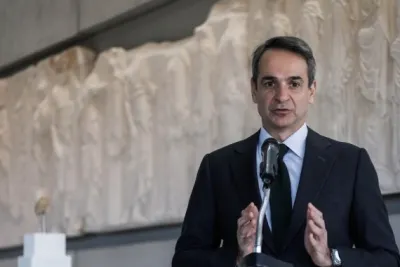What is the Greek PM's 1.6-Billion-Euro Economic Plan for 2026?

Synopsis
Key Takeaways
- 1.6 billion euro economic package announced for 2026.
- Permanent income tax cut of two percentage points for all taxpayers.
- Zero tax for workers under 25 earning up to 20,000 euros.
- Tax relief for families with four or more children.
- Long-term reforms targeting education, health, and energy sectors.
Athens, Sep 7 (NationPress) The Prime Minister of Greece, Kyriakos Mitsotakis, has unveiled a substantial economic initiative worth 1.6 billion euros (approximately $1.88 billion) for the year 2026. This plan encompasses extensive tax reductions and targeted assistance for families and young professionals.
During his address at the 89th Thessaloniki International Fair, Mitsotakis stated that these measures are designed to alleviate demographic challenges and the escalating cost of living while ensuring the stability of public finances.
Significant actions outlined include a permanent reduction of two percentage points in income tax for all taxpayers, a zero tax rate for individuals under 25 earning up to 20,000 euros annually, and substantial tax relief for families with children, as reported by Xinhua.
Families with four or more children will be exempt from paying income tax. Middle-income earners will also see reduced tax rates, while pensioners and uniformed personnel are set to receive pay increases.
The Prime Minister emphasized that these measures are feasible due to economic growth, reforms targeting tax evasion, and strict fiscal discipline. "Fiscal stability is the cornerstone of our policy," he asserted, highlighting the importance of returning growth benefits to citizens through lower taxes instead of handouts.
Mitsotakis pointed out that his administration has successfully eliminated 72 taxes and promised the most significant income tax reform since Greece's transition to democracy in 1974.
He also committed to halving the property tax (ENFIA) in villages with fewer than 1,500 residents by 2026 and completely abolishing it by 2027.
Furthermore, he outlined four long-term reforms requiring cross-party agreement: a national high school diploma for university admission, a revamped public health system, streamlined zoning processes, and a comprehensive land registry, along with a national energy strategy to ensure affordable electricity and energy independence.
"The years 2026 and 2027 are pivotal, but our ultimate goal is 2030," stated the Prime Minister, positioning the tax cuts and reforms as part of a broader strategy aimed at promoting growth, assisting families, and modernizing the state.
Despite these measures, Greece remains the most indebted nation in Europe, and disposable incomes continue to lag behind the EU average due to rising energy, food, and housing costs, which undermine purchasing power, even with a cumulative minimum wage increase of 35 percent.
The tax reform encompasses a two-percentage-point reduction in taxation across all brackets and a zero tax rate for families with four children amidst plummeting birth rates and increasing housing expenses.
Meanwhile, protests erupted in Thessaloniki, Athens, and other cities, with demonstrators criticizing the package as insufficient and expressing dissatisfaction over corruption scandals and the government's response to last year's tragic train accident. (1 euro = $1.17)









